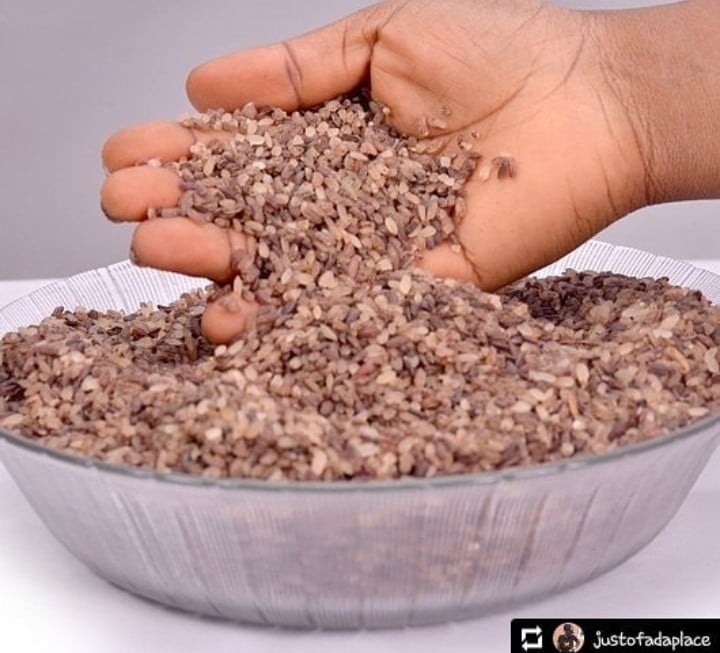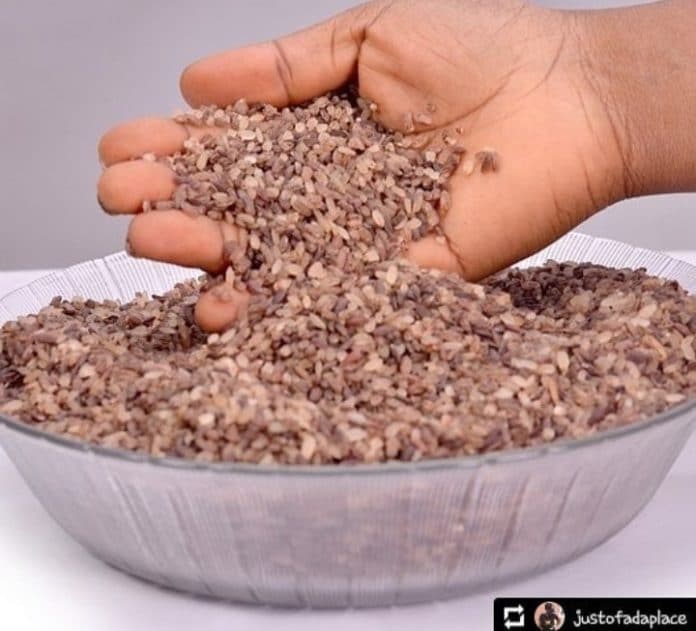Ofada rice is a local variety of rice grown in Nigeria and used in the preparation of many dishes. Ofada rice are a mixture of different rice varieties, which are are not indigenous to Africa. It is mainly grown in the southwestern part of Nigeria and is said to be named after the town of Ofada in Ogun State. This article will discuss the nutritional contents, calories, and health benefits of ofada rice [1]
Rice is one of the most consumed staple foods in Nigeria and it is served regularly in typical Nigerian homes, parties, restaurants, hotels, and lots more.
However, the vast majority of people prefer eating polished rice (white rice) to Ofada rice because it doesn’t require much effort to prepare, unlike Ofada rice that you have to pick properly before it can become eatable.
What is Ofada Rice?

Ofada rice is unpolished rice grown mainly in the southwestern part of Nigeria. It is a mixture of rice varieties like African rice and Asian rice It is difficult to mill and polish, some or all of the rice bran is left on the rice grain, which gives it more flavour and makes it more nutritious.
Is ofada rice the same as brown rice?
No, ofada rice is different from brown rice. Let me explain. There are two categories of ofada rice; white ofada rice and brown ofada rice. The categories are based on their unmilled seed colour, grain size, and shape. Unlike brown rice, which are long or slim grains, ofada rice are short fat brown or white grains.
Brown ofada rice is often very highly aromatic, while, white ofada rice is usually non-aromatic. They are renowned for swelling in size when cooked. It is sometimes processed using fermentation, which provides more aromatic quality. [2]
Nutritional Content of Ofada Rice
Ofada rice calories for one cup is 611 calories. [3] One cup of ofada rice contains:
Carbs (44 g), Fiber (3.5 g), Fat (1.8 g), Protein (5 g). It also contains Vitamin B1, B3, B6, B5 Iron, Magnesium, Phosphorus, Zinc, Copper, Manganese, Selenium.
This whole grain rice is also a great source of folate, riboflavin (B2), potassium and calcium.
7 Health Benefits of Ofada Rice

Did you know that Ofada rice is far more healthier than white rice?
Here are the health benefits of Ofada rice:
1. Prevents Neurodegenerative Diseases
Neurodegenerative diseases is a broad term used in describing conditions which affect the neurons in the human brain such as Alzheimer’s disease, Parkinson’s disease, Huntington’s disease, dementia, etc. These diseases are very serious such that they can destroy your brain’s tissue and nerves or even affect the way you walk, move, breath, and think. Some of the common symptoms include – memory loss, forgetfulness, apathy, anxiety, agitation, mood changes, to mention but a few. That said, Neurodegenerative diseases can be caused by numerous factors, including genetics-related factors, alcoholism, tumor, stroke, toxins, chemicals, and viruses.
However, it will interest you to know that Neurodegenerative diseases, in most cases have no definite cure; initial prevention is the best way to keep yourself safe from this life-threatening condition. Thankfully, multiple studies reveal that whole grain foods like Ofada rice is capable of preventing or reducing the occurrences of Alzheimer’s disease and other related neurodegenerative diseases. This is attributed to the significant amount of neurotransmitters in Ofada rice. [4]
2. Reduces the Risk of Diabetes
Diabetes is a serious health condition that must be prevented by all means to avoid the numerous complications it comes with. However, one of the best ways to prevent this condition is by eating foods that are rich in fiber, calcium, magnesium, and vitamin C as they are very effective in keeping diabetes at bay.
However, Ofada rice contains a significant amount of the aforementioned properties, and multiple studies also back it that this rice type helps in reducing the risk of diabetes.
What makes Ofada rice a healthier food choice over white rice, is that It does not undergo rigorous processing that could warrant its fiber, calcium, magnesium, and vitamin C content to be tampered with. While white rice is subjected to these processes, and this is why the latter is often associated with increased blood sugar level and high glycemic index, which may further increase the risk of diabetes.
Ofada rice has a glycemic index of 50, which is a lower glycemic index than white rice, so it has less of an impact on blood sugar.
Aside from Ofada rice, other foods that are good for preventing diabetes include – nuts, green leafy vegetables, fish, airy, and Mediterranean diet. [5]
3. Supports Bone Health
Ofada rice contains essential minerals like magnesium, phosphorus, zinc, and folate, all of which plays important role in nurturing your bones and preventing them from bone diseases while providing you with a higher bone mineral density. This is one of the reasons why Ofada rice is often recommended for the aged people as it will keep their bone healthier and stronger unlike the category of people eating foods that lack some of the aforementioned essential minerals. [6]
4. Aids Digestion
Ofada rice contains a high content of fibre [almost thrice the amount found in polished rice], which helps in promoting adequate digestion of food in the human body while preventing every form of digestive disorder from occurring.
That said, the excesses of soluble and insoluble fibre in Ofada rice also help in combating digestive system related conditions such as diarrhea, constipation, etc. while the insoluble fibre, in particular, has been proven by numerous studies to be effective in reducing the risk of gallstones in women.
5. Promotes Healthy Heart
Ofada rice contains certain properties such as magnesium and selenium, which are beneficial to the human health in multiple ways such as the prevention of – cardiovascular diseases, high blood pressure, heart rhythm problems, diabetes, celiac disease, to mention but a few.
Also, the selenium in Ofada rice helps in lowering the level of “Bad” LDL cholesterol while keeping your cholesterol levels in check and your heart fully functional.
It will interest you to know that Ofada rice contains only a few amounts of saturated fats, which makes it ideal for your heart, unlike other foods with high content of fats. [7]
6. Promotes Weight loss
As earlier said, Ofada rice contains both soluble and insoluble fiber, and these two work in synergy to reduce your fats as well as body mass index (BMI), which ultimately result in weight loss. When you eat Ofada rice, it will increase your satiety and thus help you avoid consuming excess calories that would’ve make you gain unnecessary weight. If you are wondering how to lose weight in Nigeria, then replace white rice with ofada rice.
7. Perfect Baby Food
Growing babies and toddlers constantly needs nutritious foods to help maintain their rapid growth cycles as well as to keep them healthy. However, Ofada rice comes with some of these nutrients, which make it a perfect food for your toddler.
Ofada is also naturally gluten-free.
Ofada rice is usually eaten with Ofada stew or Ayamase, and is a Nigerian meal native to the Yorubas.



